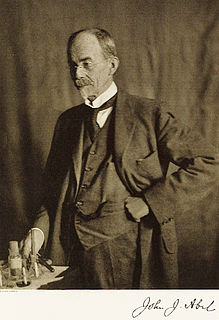A Quote by Auguste Comte
Every attempt to employ mathematical methods in the study of chemical questions must be considered profoundly irrational and contrary to the spirit of chemistry.... if mathematical analysis should ever hold a prominent place in chemistry -- an aberration which is happily almost impossible -- it would occasion a rapid and widespread degeneration of that science.
Quote Topics
Related Quotes
It seems perfectly clear that Economy, if it is to be a science at all, must be a mathematical science. There exists much prejudice against attempts to introduce the methods and language of mathematics into any branch of the moral sciences. Most persons appear to hold that the physical sciences form the proper sphere of mathematical method, and that the moral sciences demand some other method-I know not what.
It were much to be desired, that when mathematical processes pass through the human brain instead of through the medium of inanimate mechanism, it were equally a necessity of things that the reasonings connected with operations should hold the same just place as a clear and well-defined branch of the subject of analysis, a fundamental but yet independent ingredient in the science, which they must do in studying the engine.
The most powerful influence exercised by the Arabs on general natural physics was that directed to the advances of chemistry ; a science for which this race created a new era.(...) Besides making laudatory mention of that which we owe to the natural science of the Arabs in both the terrestrial and celestial spheres, we must likewise allude to their contributions in separate paths of intellectual development to the general mass of mathematical science.
As soon as we touch the complex processes that go on in a living thing, be it plant or animal, we are at once forced to use the methods of this science [chemistry]. No longer will the microscope, the kymograph, the scalpel avail for the complete solution of the problem. For the further analysis of these phenomena which are in flux and flow, the investigator must associate himself with those who have labored in fields where molecules and atoms, rather than multicellular tissues or even unicellular organisms, are the units of study.
As mineralogy constitutes a part of chemistry, it is clear that this arrangement [of minerals] must derive its principles from chemistry. The most perfect mode of arrangement would certainly be to allow bodies to follow each other according to the order of their electro-chemical properties, from the most electro-negative, oxygen, to the most electro-positive, potassium; and to place every compound body according to its most electro-positive ingredient.
Who of us would not be glad to lift the veil behind which the future lies hidden; to cast a glance at the next advances of
our science and at the secrets of its development during future centuries? What particular goals will there be toward
which the leading mathematical spirits of coming generations will strive? What new methods and new facts in the
wide and rich field of mathematical thought will the new centuries disclose?
The mathematical is that evident aspect of things within which we are always already moving and according to which we experience them as things at all, and as such things. The mathematical is this fundamental position we take toward things by which we take up things as already given to us, and as they must and should be given. Therefore, the mathematical is the fundamental presupposition of the knowledge of things.
If the system exhibits a structure which can be represented by a mathematical equivalent, called a mathematical model, and if the objective can be also so quantified, then some computational method may be evolved for choosing the best schedule of actions among alternatives. Such use of mathematical models is termed mathematical programming.
I would... establish the conviction that Chemistry, as an independent science, offers one of the most powerful means towards the attainment of a higher mental cultivation; that the study of Chemistry is profitable, not only inasmuch as it promotes the material interests of mankind, but also because it furnishes us with insight into those wonders of creation which immediately surround us, and with which our existence, life, and development, are most closely connected.
An old French mathematician said: "A mathematical theory is not to be considered complete until you have made it so clear that you can explain it to the first man whom you meet on the street." This clearness and ease of comprehension, here insisted on for a mathematical theory, I should still more demand for a mathematical problem if it is to be perfect; for what is clear and easily comprehended attracts, the complicated repels us.
...a major triumph of mathematical imagination: the use of visual imagery to condense a large quantity of information into a single comprehensible picture... Mathematicians are just beginning to understand these basic building blocks of change and to analyze how they combine. The methodology involved has a very different spirit from traditional modeling with differential equations: it is more like chemistry than calculus, requiring careful counterpoint between analysis and synthesis.
The underlying physical laws necessary for the mathematical theory of a large part of physics and the whole of chemistry are thus completely known, and the difficulty is only that the exact application of these laws leads to equations much too complicated to be soluble. It therefore becomes desirable that approximate practical methods of applying quantum mechanics should be developed, which can lead to an explanation of the main features of complex atomic systems without too much computation.





































